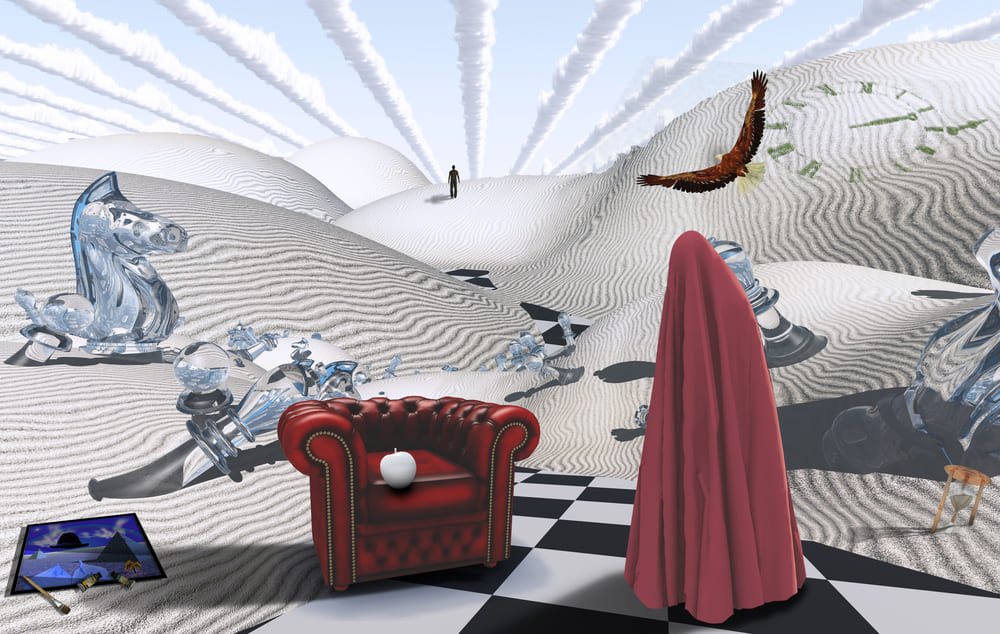T23-2 混沌の法則
But the fruit of the Spirit is love, joy, peace, forbearance, kindness, goodness, faithfulness, gentleness and self-control.
しかし、大いなる霊の果実は、愛、喜び、平安、寛容さ、優しさ、善良さ、誠実さ、温和さ、そして自制です。
Against such things there is no law.
このような果実が見出せないところには、いかなる法もないのです。

Galatians 5:22-23
ガラテヤの信徒への手紙第5章22−23節

今回は、テキスト第二十三章から「混沌の法則」をご紹介します。
[混沌の法則]
① 真理は自分たちは分離していると信じる一人ひとりにとって異なる
② 誰もみな必ず罪を犯すのだから、攻撃や死は当然の報いだ
③ 幻想によって真理を変更することができる
④ 人は自分で手に入れたものだけを自分のものにできる(それを誰かに与えるなら、自分はそれを失ってしまう)
⑤ 愛は代用で置き換えることができる
ひっくり返すとこうなります。
[秩序の法則]
① 真理は誰にとっても同じで、ひとつしかない
② 罪は実在せず、誤りに必要なのは修正だけだ
③ 幻想が真理を変更することはできない
④ 与えることで自分のものであることがわかる
⑤ 愛に代用はない

神の法とエゴの法則
神の法は、「あなたが拡張するものは、あなたにとっての現実となる」であり、
神の法を、幻想世界に即して変容させたエゴの法則は、「あなたが投影するものをあなたは信じる」
というものでした(T7-2 神の法)。
言うまでもなく、秩序の法則は、神の法に、混沌の法則は、エゴの法則に基盤を置きます。
かなり長文ですが、がんばって読んでみてください。

テキスト第二十三章
II. The Laws of Chaos
二 混沌の法則
1. The "laws" of chaos can be brought to light, though never understood.
混沌の「法則」を光の下にもたらすことはできますが、決して理解することはできません。
Chaotic laws are hardly meaningful, and therefore out of reason's sphere.
混沌の法則は少しも意味をなさず、したがって、理性の及ぶ範囲を外れているからです。
Yet they appear to be an obstacle to reason and to truth.
それでも、混沌の法則は、理性と真理に至るうえでの障害になるように見えています。
Let us, then, look upon them calmly, that we may look beyond them, understanding what they are, not what they would maintain.
そこで、私たちで冷静に混沌の法則を考察してみましょう。そうすれば、混沌の法則の向こう側を見通して、混沌の法則が擁護しようとするものではなくて、混沌の法則の正体を理解できるようになります。
It is essential it be understood what they are for, because it is their purpose to make meaningless, and to attack the truth.
最も重要なのは、混沌の法則が何のためにあるのか理解することです。なぜなら、混沌の法則の目的は、無意味なものを作り出して、真理を攻撃することにあるからです。
Here are the laws that rule the world you made.
混沌の法則こそ、あなたが作り出したこの世界を支配する法則です。
And yet they govern nothing, and need not be broken; merely looked upon and gone beyond.
けれども、混沌の法則が支配しているのは無であり、つまり、何も支配していないので、混沌の法則を破る必要はなく、ただ単に、その法則が何も支配していないことを踏まえて、その法則など無視して越えて行くだけでよいのです。
2. The first chaotic law is that the truth is different for everyone.
第一の混沌の法則は、真理は一人ひとりにとって異なる、というものです。
Like all these principles, this one maintains that each is separate and has a different set of thoughts that set him off from others.
残りの原則すべてと同じように、この法則も、各自が分離しており、自分をほかの者たちから区別する異なる思考様式をそれぞれに持っていると主張します。
This principle evolves from the belief there is a hierarchy of illusions; some are more valuable and therefore true.
この原則は、幻想には階級があるという信念を発展させたものであり、ある幻想は、ほかの幻想よりも大きな価値があるがゆえに真実だとします。
Each one establishes this for himself, and makes it true by his attack on what another values.
誰もがこの順位づけを自分で設定し、ほかの者が価値を置くものを攻撃することによって、自分の決めた序列を真実にしようとします。
And this is justified because the values differ, and those who hold them seem to be unlike, and therefore enemies.
そして、価値観はさまざまに異なり、違う価値観を抱く者たちは相互に異なる存在に見え、その結果、敵同士のように思えるので、この攻撃は正当化されます。

3. Think how this seems to interfere with the first principle of miracles.
このことが、どれほど奇跡の第一原理を妨害するように見えるか考えてみてください。
For this establishes degrees of truth among illusions, making it seem that some of them are harder to overcome than others.
というのは、それが幻想同士の間に、真理である度合いに応じた等級を設定し、幻想のうちのあるものはほかの幻想よりも克服するのがより難しいように見せかけるからです。
If it were realized that they are all the same and equally untrue, it would be easy, then, to understand that miracles apply to all of them.
もし幻想はどれもみな同じで等しく真実ではないと理解できたら、そのあとは、奇跡がすべての幻想に適用できると理解するのは簡単なはずです。
Errors of any kind can be corrected because they are untrue.
誤りはどれも真実でないがゆえに、どのような誤りでも修正できるはずだからです。
When brought to truth instead of to each other, they merely disappear.
ある誤りをほかの誤りではなく真理の許へともたらせば、誤りはただ消えてなくなるだけです。
No part of nothing can be more resistant to the truth than can another.
無の中のある部分が、ほかの部分以上に真理に対する抵抗力が強いはずがないからです。
4. The second law of chaos, dear indeed to every worshipper of sin, is that each one must sin, and therefore deserves attack and death.
第二の混沌の法則は、罪の崇拝者の誰もが本当に大切にする法則です。それは、誰もみな必ず罪を犯すのだから、攻撃と死は当然の報いだ、というものです。
This principle, closely related to the first, is the demand that errors call for punishment and not correction.
この原理は、真理は一人ひとりにとって異なるという第一の法則と密接な関係にあり、これが誤りに対して、修正ではなく処罰を要求することになります。
For the destruction of the one who makes the error places him beyond correction and beyond forgiveness.
というのは、過ちを犯す者を破滅させれば、彼を修正や赦しの及ばないところへ追いやることになるからです。
What he has done is thus interpreted as an irrevocable sentence upon himself, which God Himself is powerless to overcome.
こうして、彼がしでかした過ちは、彼自身に対する取り消しの効かない有罪宣告と解釈され、神自身ですらその裁きを覆す力はないということになります。
Sin cannot be remitted, being the belief the Son of God can make mistakes for which his own destruction becomes inevitable.
罪とは、自分自身を滅亡させることになるのを免れない過ちを犯すことが神の子にはできるという信念なので、免罪することはできないというわけです。

5. Think what this seems to do to the relationship between the Father and the Son.
取り消しの効かない罪を犯すことができるという観念が、父と子との関係性にどれほど深刻な影響を及ぼすように見えるか、考えてもみてください。
Now it appears that They can never be One again.
こうなってしまっては、父と子は二度とひとつに戻ることはできないように思えます。
For One must always be condemned, and by the Other.
なぜなら、一方はつねにもう一方によって糾弾されるに違いないからです。
Now are They different, and enemies.
いまや、両者は異なる存在であり、敵同士になってしまいます。
And Their relationship is one of opposition, just as the separate aspects of the Son meet only to conflict but not to join.
ちょうど分離した子の一部同士が、ひとつに結びつくためではなく、ただ争うためだけに出会うのと同じように、父と子の関係性は一種の敵対関係となります。
One becomes weak, the other strong by his defeat.
相手を打ち負かすことで、その関係の一方は弱くなり、もう一方は強くなります。
And fear of God and of each other now appears as sensible, made real by what the Son of God has done both to himself and his Creator.
そして、神の子が自分自身と自らの創造主の両方に対してなしたことによって、いまや、神に対する恐れや、子が互いに抱く恐れは本物とされ、恐れを抱くのは道理に適ったことのように思えてしまいます。
6. The arrogance on which the laws of chaos stand could not be more apparent than emerges here.
混沌の法則が基盤を置いている傲慢さが、ここに現れているほど露骨に明らかになることもないでしょう。
Here is a principle that would define what the Creator of reality must be; what He must think and what He must believe; and how He must respond, believing it.
ここにこそ、現実の創造主はどのような存在に違いないか、創造主は何を考え何を信じるに違いないか、そして、その信念を信じているがゆえに、創造主はどのように応答するに違いないかについて定義しようとする原理があります。
It is not seen as even necessary that He be asked about the truth of what has been established for His belief.
このように定められた創造主の信念が真実かどうか、当の創造主自身に尋ねてみる必要があるとすらみなされません。
His Son can tell Him this, and He has but the choice whether to take his word for it or be mistaken.
神の子は自分が創造主について定めたことを創造主に命じることができ、創造主は子の言葉をそのまま受け入るか、あるいは、誤解されたままでいるかしか選択肢を持たないというのです。
This leads directly to the third preposterous belief that seems to make chaos eternal.
このことが、混沌状態を永続させてしまうように見える三つ目のとんでもない信念へと直結します。
For if God cannot be mistaken, He must accept His Son's belief in what he is, and hate him for it.
というのは、もし神が誤解される余地がないとすれば、神は、神とはこのような存在だと子が信じる信念を受け入れざるをえず、そのことについて子に恨みを抱くはずだということになるからです。

7. See how the fear of God is reinforced by this third principle.
神に対する恐れが、この第三の原理によってどれほど増強されることになるか、よく理解してください。
Now it becomes impossible to turn to Him for help in misery.
こうなっては、苦難に際して神に助けを求めることすら不可能になります。
For now He has become the "enemy" Who caused it, to Whom appeal is useless.
なぜなら、いまや神こそがその苦難を生み出した「敵」になってしまったので、神に訴えても無駄だからです。
Nor can salvation lie within the Son, whose every aspect seems to be at war with Him, and justified in its attack.
かといって、子に救いを見出すこともできません。というのも、神の子は全面的に神と交戦状態にあり、攻撃は正当なことに思えるからです。
And now is conflict made inevitable, beyond the help of God.
いまや争いは避けられず、神の助けの及ばないものとなります。
For now salvation must remain impossible, because the Savior has become the enemy.
なぜなら、いまや大いなる救い主が敵に回ってしまったので、救いは不可能であり続けることにならざるをえないからです。
8. There can be no release and no escape.
解放される望みもなければ、いかなる逃げ道もありません。
Atonement thus becomes a myth, and vengeance, not forgiveness, is the Will of God.
かくして、贖罪は神話となり、赦しではなく復讐こそが神の意志となります。
From where all this begins, there is no sight of help that can succeed.
こうしたことがすべて始まるところからは、うまくいく助けを受けられる見込みはどこにも見当たりません。
Only destruction can be the outcome.
ただ破滅だけが見込める結果です。
And God Himself seems to be siding with it, to overcome His Son.
そのうえ、神自身が破滅に味方して、子を打ち倒そうとしているように見えます。
Think not the ego will enable you to find escape from what it wants.
エゴが望むことからの逃げ道をあなたが見つけられるように、当のエゴが手助けしてくれるだろうなどと思わないことです。
That is the function of this course, which does not value what the ego cherishes.
それこそが、このコースの役目です。このコースは、エゴが大切にしているものに価値を置くことはないからです。

9. The ego values only what it takes.
エゴは自分が奪うものだけを大切にします。
This leads to the fourth law of chaos, which, if the others are accepted, must be true.
これが混沌の第四の法則を導きます。もしほかの三つの法則が受け入れられるなら、この四番目の法則も本物に違いないということになります。
This seeming law is the belief you have what you have taken.
この法則らしきものは、あなたは自分が奪い取ったものを得ることができる、という信念です。
By this, another's loss becomes your gain, and thus it fails to recognize that you can never take away save from yourself.
これによれば、誰かの損失があなたの得になるということになり、それゆえ、この法則は、あなたは絶対に自分自身からしか奪えないことを認識できないようにしてしまいます。
Yet all the other laws must lead to this.
しかし、ほかの混沌の法則はどれもすべて、必ずこの第四法則に帰結します。
For enemies do not give willingly to one another, nor would they seek to share the things they value.
というのは、敵同士は自ら進んで相手に与えようとはしないし、自分の大切するものを相手と分かち合おうとはしないからです。
And what your enemies would keep from you must be worth having, because they keep it hidden from your sight.
それに、あなたの敵たちがあなたに渡さずに取っておこうとするものは、敵があなたの目につかないように隠そうとするくらいなのだから、きっと持っておく価値があるに違いないというわけです。

10. All of the mechanisms of madness are seen emerging here: the "enemy" made strong by keeping hidden the valuable inheritance that should be yours; your justified position and attack for what has been withheld; and the inevitable loss the enemy must suffer to save yourself.
狂気のメカニズムの全貌がここに浮き彫りになっています。すなわち、本来あなたが受け継ぐべきものである価値ある遺産をあなたから隠しておくことで「敵」が強くなっているのだとすれば、自分に与えられずにきた本来自分のものになるべきものを取り返すために攻撃する資格があなたには当然にあり、あなた自身を救うために敵が損失を被ったとしても、それは仕方のないことだということになります。
Thus do the guilty ones protest their "innocence. "
かくして、有罪である者たちは、次のように自らの「潔白」を抗弁します。
Were they not forced into this foul attack by the unscrupulous behavior of the enemy, they would respond with only kindness.
すなわち、敵の恥知らずな行動によって不本意にもこのような不穏当な攻撃に出ることを強いられさえしなかったら、自分はただ友好的に対応するつもりだった。
But in a savage world the kind cannot survive, so they must take or else be taken from.
しかし、殺伐とした世界の中では優しい者は生き残ることはできない、だから、奪わなければ奪われてしまうだけなので、奪わざるをえないのだ、と弁明するのです。

11. And now there is a vague unanswered question, not yet "explained. "
そしてここに、まだ答えられてはおらず、まだ「解き明かされ」ていないひとつの漠然とした疑問があります。
What is this precious thing, this priceless pearl, this hidden secret treasure, to be wrested in righteous wrath from this most treacherous and cunning enemy?
このきわめて背信的で狡猾な敵から、正義の怒りに燃えてもぎ取ろうとするこの貴重なもの、このかけがえのない真珠、この秘密の宝物とはいったい何なのでしょうか。
It must be what you want but never found.
それはあなたが望んでいながらも、決して見つけ出せずにいるものに違いありません。
And now you "understand" the reason why you found it not.
そして、今、あなたは、なぜ自分がそれを見つけられなかったのか、その理由を「理解」します。
For it was taken from you by this enemy, and hidden where you would not think to look.
というのも、その宝物は、この敵によってあなたから奪い取られて、あなたが見てみようとも思わないようなところに隠されてしまっていたからです。
He hid it in his body, making it the cover for his guilt, the hiding place for what belongs to you.
敵はその宝を自らの身体の中に隠し、身体を彼の罪悪感を包み込むための覆いにして、あなたに属するはずのものの隠し場所にしたのです。
Now must his body be destroyed and sacrificed, that you may have that which belongs to you.
こうなっては、あなたが自分に属するものを取り戻すためには、その敵の身体を破壊して犠牲にするほかありません。
His treachery demands his death, that you may live.
宝を身体に隠すという敵の欺瞞のせいで、あなたが生き延びるために彼の死が必要となるのです。
And you attack only in self-defense.
だからあなたは、正当防衛としてのみ攻撃するのです。
12. But what is it you want that needs his death?
しかし、あなたが相手の死を必要としてまで望むほどの宝とは、いったい何なのでしょうか。
Can you be sure your murderous attack is justified unless you know what it is for?
あなたも、それが何のためなのかわからなければ、あなたの必殺の攻撃が正当なものなのか確信が持てないのではないでしょうか。
And here a final principle of chaos comes to the "rescue. "
そしてここに至って、混沌の最後の原理が「救援」に駆けつけます。
It holds there is a substitute for love.
その原理は、愛は代用で置き換えることができるというものです。
This is the magic that will cure all of your pain; the missing factor in your madness that makes it "sane. "
この愛が代替できるという原理こそ、あなたのあらゆる苦痛を治す魔術であり、あなたの狂気を「正気」にするために欠けている要素だというのです。
This is the reason why you must attack.
愛が代替できることこそ、あなたが攻撃しなければならない理由だというのです。
Here is what makes your vengeance justified.
あなたの復讐が正当化されるのは、愛は代用できるからだというのです。
Behold, unveiled, the ego's secret gift, torn from your brother's body, hidden there in malice and in hatred for the one to whom the gift belongs.
あなたの兄弟の身体から引き剥がされて、ヴェールを剥ぎ取られた、このエゴの秘密の贈り物をよく見てください。それは贈り物の持ち主に対する敵意や憎しみの内に隠されていたものです。
He would deprive you of the secret ingredient that would give meaning to your life.
兄弟は、あなたの人生に意義を与えてくれる秘密の要素をあなたから奪おうとしていたというのです。
The substitute for love, born of your enmity to your brother, must be salvation.
あなたの兄弟に対する恨みから生じる愛の代用が救いとなるに違いないというのです。
It has no substitute, and there is only one.
この兄弟への敵意から生じる愛の代用には代わりなどなく、愛の代用はこれしかありません。
And all your relationships have but the purpose of seizing it and making it your own.
そして、あなたの関係はどれもみな、ただ救いとしての愛の代用を掴み取って自分のものにすることだけを目的としているのです。

13. Never is your possession made complete.
あなたは、自分の得たものの所有を、決して全うすることができません。
And never will your brother cease his attack on you for what you stole.
そして、あなたの兄弟は、あなたが盗んだもののために、あなたを攻撃することを決してやめようとしないでしょう。
Nor will God end His vengeance upon both, for in His madness He must have this substitute for love, and kill you both.
しかも、あなたと兄弟の双方に対する神の報復も終わることはないでしょう。なぜなら、神も狂気のあまり、何としてもその愛の代用を手に入れようと、あなたたち両者を殺そうとしているということになるからです。
You who believe you walk in sanity with feet on solid ground, and through a world where meaning can be found, consider this:
あなたは、確固たる大地に足を踏み締めながら、自分は生きる意味を見出せる世界を正気で歩んでいると信じていますが、そんなあなたに次のことをよく考えてみてもらいたいのです。
These are the laws on which your "sanity" appears to rest.
それは、あなたの「正気」が拠って立つ基盤のように見えているのは、これらの混沌の法則なのだということです。
These are the principles which make the ground beneath your feet seem solid.
このような原理が、あなたが足を置く地面が堅固であるかのように思わせているのです。
And it is here you look for meaning.
そして、あなたは、こんな場所で意味を探しているのです。
These are the laws you made for your salvation.
これが、自分が救われるようにとあなたが作り出した法則です。
They hold in place the substitute for Heaven which you prefer.
これらの法則が、あなたが天国の代用として選んだ場所に行き渡っています。
This is their purpose; they were made for this.
天国の代用となることがこれらの法則の目的であり、このためにこそ、これらの法則は作り出されたのです。
There is no point in asking what they mean.
これらの法則が何を意味するか尋ねることに意味はありません。
That is apparent.
それは明らかです。
The means of madness must be insane.
狂気の手段は、狂っているに違いありません。
Are you as certain that you realize the goal is madness?
はたしてあなたは、手段が狂気であることを確信するのと同じくらいの確実さで、その目標も狂気であると自分がわかっていると確信しているでしょうか。
14. No one wants madness, nor does anyone cling to his madness if he sees that this is what it is.
誰も狂気を望んでなどいないし、誰もそれが狂気だとわかっていたら、狂気にしがみつこうとはしないはずです。
What protects madness is the belief that it is true.
狂気の沙汰を守っているのは、その狂気が真実だという信念です。
It is the function of insanity to take the place of truth.
真理の代わりをするのが狂気の役目なのです。
It must be seen as truth to be believed.
狂気の沙汰が信じられるためには、それが真理だとみなされなければなりません。
And if it is the truth, then must its opposite, which was the truth before, be madness now.
そして、もし狂気が真理だということになれば、それ以前は真理であったその狂気の対極のほうが、今度は狂気であるに違いないということになります。
Such a reversal, completely turned around, with madness sanity, illusions true, attack a kindness, hatred love, and murder benediction, is the goal the laws of chaos serve.
こんなふうに裏返しになった状態、すなわち、狂気が正気に、幻想が真実に、攻撃が優しさに、憎しみが愛に、殺人が祝福に取って代わるというふうに完全な逆転を実現することが混沌の法則が奉仕する目標なのです。
These are the means by which the laws of God appear to be reversed.
これらの混沌の法則は、神の法を正反対のものに見せかけるための手段です。
Here do the laws of sin appear to hold love captive, and let sin go free.
ここにおいては、罪の法則は、たしかに愛を虜囚にして罪を解放しているかのように見えます。

15. These do not seem to be the goals of chaos, for by the great reversal they appear to be the laws of order.
混沌がこうしたことを目標にしているようには見えません。というのも、見事な逆転によって、混沌の法則こそ秩序をもたらす法則であるかのように見えるからです。
How could it not be so?
そう見えないわけがありません。
Chaos is lawlessness, and has no laws.
混沌とは無法状態のことなのだから、混沌にはいかなる法則もありえません。
To be believed, its seeming laws must be perceived as real.
信じてもらうためには、その見せかけの法則が本物だと知覚されなければなりません。
Their goal of madness must be seen as sanity.
法則の奉仕する狂気という目標が正気とみなされる必要があります。
And fear, with ashen lips and sightless eyes, blinded and terrible to look upon, is lifted to the throne of love, its dying conqueror, its substitute, the savior from salvation.
そこで、青ざめた唇と見えない目を持つ理性を失った見るも無惨な姿の恐怖が、瀕死で愛を征服して愛に取って代わる救済からの救い主として愛の玉座へと祭り上げられます。
How lovely do the laws of fear make death appear.
恐怖の法則は、死をなんと美しいものに見せかけることでしょう。
Give thanks unto the hero on love's throne, who saved the Son of God for fear and death!
愛の玉座に就いたその英雄に感謝を捧げよ、彼こそが恐れと死のために神の子を救い出してくれたのだから、というわけです。
16. And yet, how can it be that laws like these can be believed?
それにしても、どうしてこの程度の法則を信じこむことができてしまうのでしょうか。
There is a strange device that makes it possible.
それを可能にする奇妙なからくりがあるのです。
Nor is it unfamiliar; we have seen how it appears to function many times before.
しかも、そのからくりは馴染みのないものではないし、私たちは、そのからくりがどのように作用するように見えるか、以前に何度も見てきました。
In truth it does not function, yet in dreams, where only shadows play the major roles, it seems most powerful.
本当のところ、そのからくりは何の働きもしないのですが、影だけが主要な役割を演じる夢の中では、このからくりは非常に強力なものに見えます。
No law of chaos could compel belief but for the emphasis on form and disregard of content.
混沌の法則はどれもみな、形式を強調して内容を無視することで、むりやり信じこませることしかできません。
No one who thinks that one of these laws is true sees what it says.
こうした法則がひとつでも本当だと思う者は誰も、それが何を言わんとするのかわかっていません。
Some forms it takes seem to have meaning, and that is all.
混沌の法則がとる形の中のいくつかには意味があるように見える、ただそれだけです。

17. How can some forms of murder not mean death?
殺人の中でも、ある種の形の殺人だけは死を意味しないなどということが、どうしてありうるでしょうか。
Can an attack in any form be love?
何らかの形の攻撃だけは愛することになるということがありうるでしょうか。
What form of condemnation is a blessing?
どんな形の非難であれば、それが祝福になるというのでしょうか。
Who makes his savior powerless and finds salvation?
自分の救い主を無力にしておきながら、誰が救いを見出せるというのでしょうか。
Let not the form of the attack on him deceive you.
自分の救い主に対する攻撃の形に惑わされてはなりません。
You cannot seek to harm him and be saved.
あなたは、自分の救い主に危害を加えようとしておきながら、救われることはできません。
Who can find safety from attack by turning on himself?
いったい誰が、自分自身を攻撃することによって攻撃からの安全を見出せるでしょうか。
How can it matter what the form this madness takes?
この狂気がどんな形をとろうが、そんなことは重要ではありません。
It is a judgment that defeats itself, condemning what it says it wants to save.
こんな狂気は、自分を救いたいと言ってくれる者に対して有罪判決を宣告することで、自分自身を破滅させる裁きを下しているのです。
Be not deceived when madness takes a form you think is lovely.
狂気があなたにとって素晴らしいと思えるような形をとっているとしても、その形に騙されてはなりません。
What is intent on your destruction is not your friend.
あなたの破滅を意図するものは、あなたの味方ではないのです。
18. You would maintain, and think it true, that you do not believe these senseless laws, nor act upon them.
あなたは、自分はこんな無意味な法則を信じてなどいないし、こんな法則に基づいて行動してなどいないと言い張るだろうし、本当にそう思いたがるでしょう。
And when you look at what they say, they cannot be believed.
たしかに、あなたがこれらの法則の述べることをよく考察するなら、これらの法則は信じるに足るものではないでしょう。
Brother, you do believe them.
それでも、兄弟よ、あなたは確かにこれらの混沌の法則を信じているのです。
For how else could you perceive the form they take, with content such as this?
というのも、あなたが信じているのでなければ、この程度の内容しか持たない法則がとる形をあなたが知覚できてしてしまうはずがないからです。
Can any form of this be tenable?
混沌の法則がとる形のうちのどれかだけは、擁護できるというのでしょうか。
Yet you believe them for the form they take, and do not recognize the content.
いずれにせよ、あなたは、それらの法則のとる形のゆえに法則をそのまま信じてしまっていて、法則の中身には気づいていないのです。
It never changes.
法則の内容は決して変わりはしません。
Can you paint rosy lips upon a skeleton, dress it in loveliness, pet it and pamper it, and make it live?
骸骨に口紅を塗って、可愛らしいドレスを着せて、ちやほやすれば、それに生命を与えることができるとでもいうのでしょうか。
And can you be content with an illusion that you are living?
それに、あなたは自分が生きているという錯覚で満足できるのでしょうか。

19. There is no life outside of Heaven.
天国の外側に生命は存在しません。
Where God created life, there life must be.
神が生命を創造したところにこそ、生命はあるはずです。
In any state apart from Heaven life is illusion.
どんな状態であれ天国から離れたところでは、生命は幻想です。
At best it seems like life; at worst, like death.
その幻想は、最善の状態では、生きているように見えるし、最悪の状態では、死んでいるように見えます。
Yet both are judgments on what is not life, equal in their inaccuracy and lack of meaning.
しかし、これは両方とも生命ではないものについての判断であって、それらが誤りであって意味を欠いているという点ではどちらも同じです。
Life not in Heaven is impossible, and what is not in Heaven is not anywhere.
天国の中ではないところに生命はありえないし、天国の中にないものはどこにもありません。
Outside of Heaven, only the conflict of illusion stands; senseless, impossible and beyond all reason, and yet perceived as an eternal barrier to Heaven.
天国の外には、幻想同士の葛藤があるだけです。幻想同士の葛藤は、無意味だし、ありえないし、まったく道理に合いません。それでも、そんな幻想が、天国への道を妨げる永遠の障壁として知覚されているのです。
Illusions are but forms.
幻想は形にすぎません。
Their content is never true.
幻想の中身は決して真実ではないのです。
20. The laws of chaos govern all illusions.
混沌の法則が、すべての幻想を支配しています。
Their forms conflict, making it seem quite possible to value some above the others.
個々の幻想の形態は食い違っているので、ある幻想をほかの幻想よりも価値あるものとして尊重することが本当に可能であるように思えます。
Yet each one rests as surely on the belief the laws of chaos are the laws of order as do the others.
しかし、どの幻想もほかの幻想と同じように、混沌の法則こそが秩序の法則なのだという信念に依拠していているのは間違いありません。
Each one upholds these laws completely, offering a certain witness that these laws are true.
一つひとつの幻想が、混沌の法則を完全に支持し、これらの法則が真実であることを示す確たる証拠を提示します。
The seeming gentler forms of the attack are no less certain in their witnessing, or their results.
攻撃が見かけ上より穏やかな形をとっていたとしても、それがもたらす証拠や成果は同じように確かなものです。
Certain it is illusions will bring fear because of the beliefs that they imply, not for their form.
幻想は、その形ゆえにではなくて、それが言外に仄めかす信念のために、確実に恐怖心を抱かせます。
And lack of faith in love, in any form, attests to chaos as reality.
そして、どのような形にせよ、愛に対する信頼の欠如は、混沌こそ現実だと証明することになります。

21. From the belief in sin, the faith in chaos must follow.
罪に対する信念のあとには、必ず混沌に対する信頼が続いてきます。
It is because it follows that it seems to be a logical conclusion; a valid step in ordered thought.
なぜなら、それが論理的な帰結であり、秩序だった思考を正しく辿れば、当然そこにつながるように思えるからです。
The steps to chaos do follow neatly from their starting point.
混沌へ向かう足取りは、たしかにその出発点からきちんと段階を踏んでいます。
Each is a different form in the progression of truth's reversal, leading still deeper into terror and away from truth.
その一段いちだんが異なった形で真理とは逆の方向へと徐々に進んでおり、恐怖の中へとますます深入りし、真理から離れてゆきます。
Think not one step is smaller than another, nor that return from one is easier.
ある一段はほかの一段より小さいとか、この一段からなら簡単にあと戻りできるとなど考えてはなりません。
The whole descent from Heaven lies in each one.
その一段いちだんに、天国からの全面的な墜落が潜んでいるからです。
And where your thinking starts, there must it end.
だから、もしあなたが幻想について考えはじめたら、その場で即刻、それを考えるのをやめなければなりません。
22. Brother, take not one step in the descent to hell.
兄弟よ、地獄へと下降する階段を一歩たりとも踏み出してはなりません。
For having taken one, you will not recognize the rest for what they are.
というのは、一歩でも踏み出せば、あなたには、その先に続く階段がどのようなものなのか見分けがつかなくなってしまうからです。
And they will follow.
その先にも下降する階段が続いているのは確かです。
Attack in any form has placed your foot upon the twisted stairway that leads from Heaven.
どのような形であれ、攻撃することが、あなたの足を天国から下降する捻じ曲がった階段を下らせてきました。
Yet any instant it is possible to have all this undone.
しかし、どの瞬間にも、こうしたことをすべて取り消してもらうことは可能です。
How can you know whether you chose the stairs to Heaven or the way to hell?
どうやって、あなたは自分が天国への階段を選んだのか、地獄への道を選んだのか、見分ければよいのでしょうか。
Quite easily.
それは実に簡単です。
How do you feel?
あなたはどのように感じているでしょうか。
Is peace in your awareness?
あなたは平安を自覚しているでしょうか。
Are you certain which way you go?
あなたは、自分がどちらの道を進んでいるか確信しているでしょうか。
And are you sure the goal of Heaven can be reached?
そして、あなたは、天国という目的地に到達できると確信しているでしょうか。
If not, you walk alone.
もしあなたが確信していないなら、あなたはひとりきりで歩いているのです。
Ask, then, your Friend to join with you, and give you certainty of where you go.
そんなときは、あなたの大いなる友である聖霊に、あなたとひとつに結びついて、あなたに自分の進路に確信が持てるようにしてほしいと頼みなさい。


- 関連記事
-
-
 T23-1 相容れない信念
T23-1 相容れない信念
-
 T23-4 戦場の上空へ
T23-4 戦場の上空へ
-
 T23-3 妥協することのない救済
T23-3 妥協することのない救済
-
 T23-2 混沌の法則
T23-2 混沌の法則
-
 T23-Intro 自分自身との戦い
T23-Intro 自分自身との戦い
-